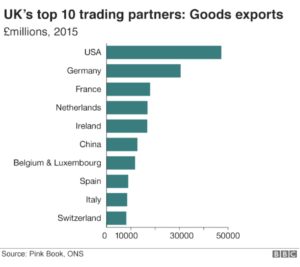Britain may never export something as good as cricket to India ever again. But as the deadline for Brexit gets ever-closer, the Government has never been so keen to promote UK exporting to India.
The approach seems to be working; according to the Economic Times as Britain’s services and goods exports to India shot up 31.8 per cent in the year to March 2018 and the UK was the third biggest investor in India in 2015, so there’s a vested interest to grow that figure.
The UK exported £5.7 billion of goods in 2016 up from just over £2 billion in 2003.

Britain needs trading strong partners outside the EU as it prepares for Brexit, and India seems the perfect fit.
The country:
- is expected to become the third largest economy in the world by 2030
- has English as generally the first language
- has a growing middle class and a population of 1.2 billion
- has reduced its trade tariffs in recent years to be more globally competitive
- has similar admin/law system and a rich trading history with the UK
The UK and India currently have a bilateral trade agreement which normally means lower tariffs, import quotas and export restraints.
These agreements are complex so for the purposes of this article, we’ll be focussing on the visible trade of goods and services, rather than less visible trading like private equity investments.
See more:
Why exporting is your gateway to growth and how to get started
EORI number: What it is and how to get or check one
Commodity codes: The essential guide
What’s the financial system like when exporting to India?
Until quite recently, Indian society was 89 per cent dominated by cash, with direct debits (or recurring payments) not invented. This meant that for a long time if Indian’s wanted to take out a subscription like a magazine they would have to turn up at the Post Office with enough cash to pay for a whole year, rather than enjoy the monthly subscription systems in the UK. However, recent rule change means money can now be transferred electronically quickly and DDs are now a reality.
Big Indian banks like HDFC and ICICI have reported huge increases in banking transactions, which has led to calls for new technology to handle the rise in volume.
Before getting involved in trading with India, Geoff Runcie, MD of consultancy firm Morgan Goodwin and a former chief executive of the Glasgow Chamber of Commerce says, ‘One of the critical elements of preparation for any business seeking to begin exporting to India is to understand the capability of its existing admin systems and capacity because exporting, especially to a foreign-language and culturally different market like India, generates a phenomenal amount of new documentation and workload.’
Here is a list of the top ten imports from the UK to India, according to the World Bank.
|
Description |
Value (US$) |
|
Precious metals |
1.58 billion |
|
Machinery and mechanical appliances |
693 million |
|
Iron and Steel |
420 million |
|
Electrical machinery and parts |
318 million |
|
Optical and photographic |
268 million |
|
Aluminium |
220 million |
|
Beverages and spirits |
204 million |
|
Aircraft/spacecraft |
173 million |
|
Plastics |
132 million |
|
Automative |
105 million |
Who do I hire?
All of the businesses we spoke to who currently have operations in India advised that UK businesses hire Indian staff. ‘Be prepared to visit regularly, have realistic time expectations and consider hierarchy, which is still very strong in India and cannot be shortcut,’ said Mark Curtis, managing director of UK microscope manufacturer, Vision Engineering.
What businesses do well in India?
There is a huge demand for British manufacturing products and consumer goods and this is set to increase says Siddharth Shankar, an expert in trading with Asia and CEO of Tail’s Trading. ‘British goods have a name in India for their quality and are in high demand,’ he says.
Find out more: UK India Business Council






